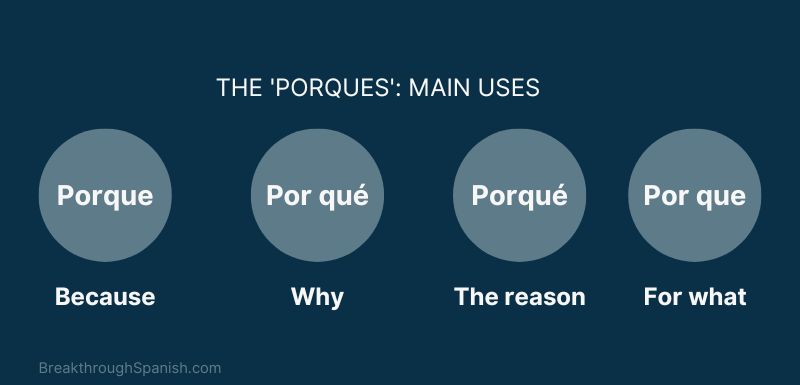Let’s call them “the porques”. In Spanish, there is Por qué, porque, por que, and porqué.
They all sound the same but are used in 4 different ways. Luckily, since they sound the same, you don’t need to worry about them while speaking.
In fact, it’s a confusing topic even for native speakers.
So as a learner, it’s good to understand the differences. You won’t understand them perfectly right away, but getting an overview now will help you understand the differences over time.
The 4 ways to use porque
Here’s an overview of the 4 main uses of por qué vs porque vs porqué vs por que:
| Spanish | English |
| Por qué | Why |
| Porque | Because |
| El porqué | The reason/cause |
| Por que | For which |
Below, we’ll compare each of these in detail and look at some examples.

Por qué vs porque: why vs because. “Por qué” is literally “For what”.
How to use por qué
Por qué is for questions: it means “why?”. There are two situations where you’ll use it.
Direct questions
| Spanish | English |
| ¿Por qué no estás trabajando hoy? | Why aren’t you working today? |
| ¿Por qué hay tanta gente aquí? | Why are there so many people here? |
| ¿Por qué no quieres ir conmigo? | Why don’t you want to go with me? |
Reported questions
| Spanish | English |
| No entiendo por qué no estás trabajando hoy | I don’t understand why you’re not working today |
| No sé por qué hay tanta gente aquí | I don’t know why there are so many people here |
| Ella no me dijo por qué no quiere ir conmigo | She didn’t tell me why she doesn’t want to go with me |
Through which/what
| Spanish | English |
| ¿Sabes por qué puerta sale el avión? | Do you know which gate the plane leaves from (lit. “through what gate”) |
| No sé por qué calle hay que ir | I don’t know which street we need to take (lit. “through what street”) |
| ¿Viste por qué puerta salió? | Did you see which door he left through? (lit. “through what door”) |
How to pronounce por qué in a sentence
How to Use Porque
The most common use of porque is to say because. It’s a way to respond to a question and join two thoughts.
Porque can also be used to say “So that”, but it’s less common than “Para que”.
Let’s look at a few examples of porque in a sentence.
Porque for Responding to a question
The most common use of porque is to reply to a question – in the same way that we use because in English.
| Spanish | English |
| – ¿Por qué no vienes? – Porque no tengo tiempo | – Why aren’t you coming? – Because I don’t have time |
| – ¿Por qué hace tanto calor? – Porque hay una ola de calor | – Why is it so hot? – Because there is a heat wave |
| – ¿Por qué no nieva en Puerto Rico? – Porque es demasiado tropical | – Why doesn’t it snow in Puerto Rico – Because it’s too tropical |
Often, ya que (since) can also be used here. (Ya que Puerto Rico es una isla tropical, no nieva allá).
Porque for Describing a reason why or joining two thoughts
| Spanish | English |
| Quería ir porque se veía bonito en las fotos | I wanted to go because it looked pretty in the photos |
| No voy porque tengo que trabajar | I’m not going because I have to work |
| El estadio está abarrotado porque hay un partido importante | The stadium is packed because there’s an important game |
Porque for “So that”
Porque can also mean “so that”. This is more advanced usage since it requires the subjunctive tense.
| Spanish | English |
| Porque podamos comer a las ocho, necesitamos preparar la comida ahora | So that we can eat at 8, we need to prepare the food now |
| Reza porque te den una buena nota | Pray |
| Hice lo que pude porque no saliera mal | The stadium is packed because there’s an important game |
Technically, it can be written either porque or por que. (Hice lo que pude por que no saliera mal)
Note: In these situations, para que has the same meaning — so that. Para que tends to be more common.
– Para que podamos comer a las ocho, necesitamos preparar la comida ahora
– Reza para que te den una buena nota
– Hice lo que pude para que no saliera mal
How to pronounce porque in a sentence
How to Use Porqué
Using porqué is simple: it’s a noun, meaning reason or cause.
| Spanish | English |
| Los entrenadores quieren saber el porqué de la pérdida | The coaches want to know the reason for the loss |
| Mi mamá siempre sabe el verdadero porqué | My mom always knows the real reason why |
| Todo tiene su porqué | Everything has its reason |
How to pronounce porqué in a sentence
How to use Por que
Por que (two words, no accent) is the least common of the uses.
Por que for a cause /reason (“For which”)
Por que (without an accent on the e) equates to “for which”.
| Spanish | English |
| La razón por que no vine | The reason I didn’t come (lit. for that I did not come) |
| La puerta por que salió el vuelo | The gate where the flight left (lit. through what left the plane) |
| El camino por que vinimos | The path we came from (lit. through what we came) |
However, this form is less common. Usually, you’ll hear people put an article between por and que:
- La razón por la que no vine
- La puerta por la que salió el vuelo
- El camino por el que vinimos
Por que in phrases where por is required.
Some phrases require por. This includes verb phrases, like preocuparse por (to worry about), luchar por (to fight for), optar por (opt for), as well as adjective phrases, like estar ansioso por (to be excited for).
| Spanish | English |
| Me preocupo por que estés sano y salvo | I worry that you are safe and sound |
| Todos optamos por que no hubiera otro partido | We all opted for there not being another game |
| Estoy ansiosa por que empiecen las vacaciones | I’m excited / eager for the holidays to start |
The ‘porques’ in Spanish are tricky
But don’t let that get you down. Remember — they all sound roughly the same, so when you’re speaking you don’t need to worry about them.
The most important are por qué (why) and porque (because).
If you’re working on those, start by making 3 of your own sentences with each of those.
If you’re comfortable with por qué and porque, practice the next two: Porqué (the reason) and por que (so that). Make 3 of your own sentences with each of those.
Leave your sentences in the comments and let me know if you have any questions.



Hi i am kavin, its my first occasion to commenting anywhere, when i read
this paragraph i thought i could also make comment due
to this brilliant piece of writing.
Hi! I’m a Mexican Spanish native speaker and I found your channel while watching some Russian and Spanish phonetics. XD I like grammar and phonetics, so I know the rules for these “porque”, but it is rare to see explaining them in English.
Very well done!
Just a little mistake in “Por que for a cause /reason (“For which”)”. You wrote a negative example in Spanish (La razón por que no vine…), but in the English translation you wrote it a positive one (The reason I came (for that I came). Just that.
Also, congratulations for your excellent work and website!! If you ever need something related to Spanish, feel free to reach out. Take care!
Thanks Fernando! I have corrected that mistake. I appreciate you checking out my site!